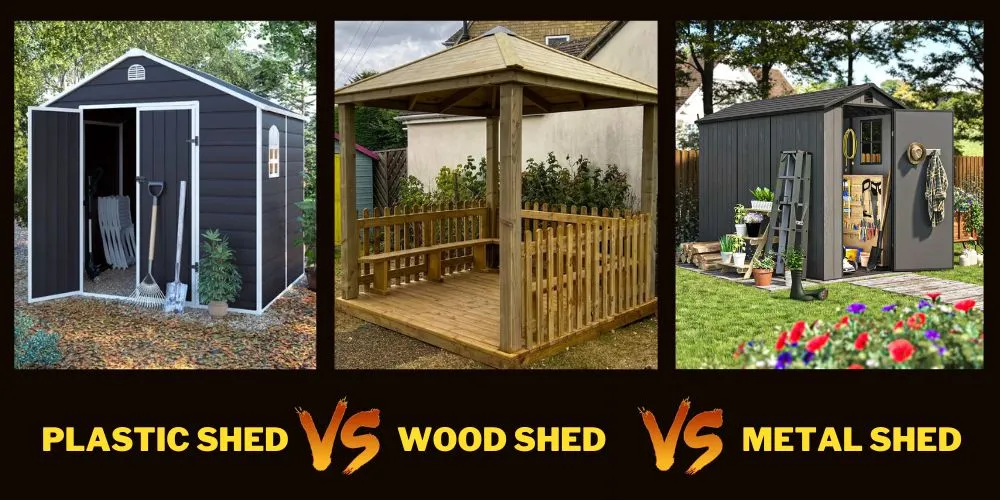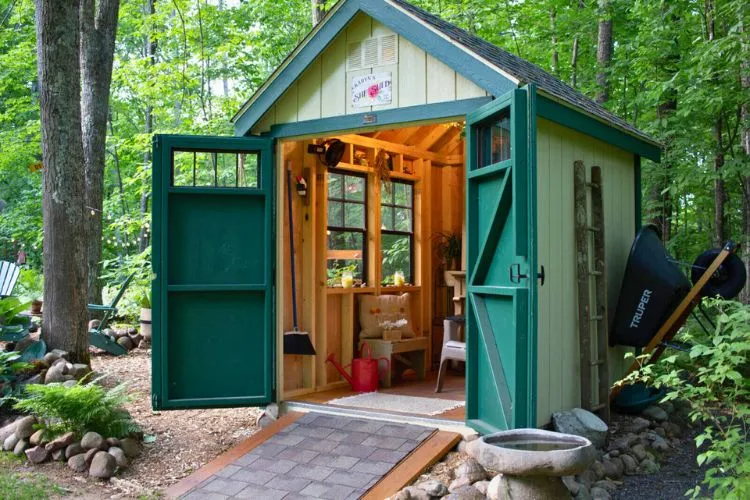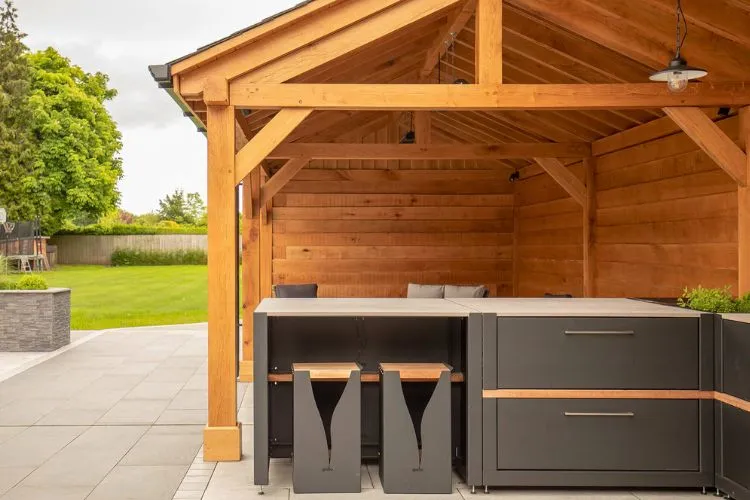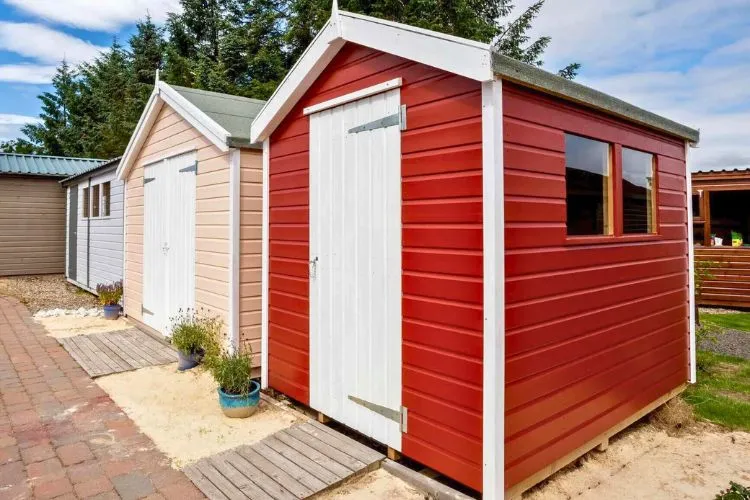When it comes to selecting a garden shed, the material is a significant consideration. Sheds are not just a practical storage solution but also an addition to your outdoor space that can affect its aesthetic.
The common materials for sheds – plastic, wood, and metal – each have their own benefits and considerations. In this article, we will dissect the plastic vs wood vs metal shed characteristics, durability, costs, and more, to help you make an informed choice.

Contents
Understanding Shed Materials
Garden sheds can be made from various materials, but plastic, wood, and metal are the most prevalent.
These materials differ in numerous ways, including appearance, cost, durability, and maintenance needs. It is essential to have a solid understanding of each to decide which is right for you.
Plastic Sheds
Plastic sheds are made from different types of polymers, including resin and vinyl, known for their durability and resistance to rot. These sheds are often appreciated for their low-maintenance nature.

They are lightweight and can be moved if needed, yet they remain sturdy and can withstand various weather conditions. While they might not have the same rustic charm as wooden sheds, plastic sheds offer a modern look and are frequently a cost-effective choice.
Wood Sheds
Wooden sheds are classic and can effortlessly blend into most garden settings. Different woods such as cedar and pine are used, and these can vary in durability and cost.

Wood sheds are favored for their natural beauty and the ability to customize them through painting or staining.
However, this material does require regular care to maintain its appearance and durability. Over time, wood may rot if not adequately treated, making maintenance a critical aspect of owning a wood shed.
Metal Sheds
Metal sheds are made from materials like aluminum or steel and are known for their robustness and security. They tend to be more secure than plastic or wood sheds, making them an excellent choice for storing valuable items.
However, metal sheds can be susceptible to rust and may need treatment to prevent corrosion. They also suffer from condensation more often than their counterparts, which can sometimes lead to dampness inside the shed.
Plastic vs Wood vs Metal Shed
Durability and Weather Resistance
When considering a shed, it is crucial to think about how well it will hold up against the elements. Plastic sheds are resistant to rot and decay and can last for many years with minimal upkeep.
Wood sheds need to be treated regularly to protect against moisture, which can lead to rot or fungus. On the other hand, metal sheds are incredibly durable but can begin to rust over time, especially if they are not correctly treated or if they are in a salty sea-air environment.
Maintenance Requirements
Maintenance is a major consideration and varies widely between the different materials. Plastic sheds tend to be low maintenance; they may need an occasional wash but otherwise are worry-free.
Wood requires a lot more care, including regular treatment to protect against weather and pests. Metal sheds may need preventive treatment against rust and should be checked regularly for any signs of wear or weaknesses.
Cost and Value
The initial outlay for a shed can differ. Plastic sheds typically offer the lowest starting price but may not have the same lifespan or strength as other materials. Wood sheds can be more expensive initially but are often more robust and picturesque.
Metal sheds may also be a more costly option, but they can offer great value due to their long-term durability.
Aesthetics and Customization
If you’re looking for aesthetic appeal, wood sheds usually win hands down. They offer a classic look and can be customized with paint or stains to match your garden or personal taste.
Plastic sheds have come a long way in terms of design and can now emulate wood or other finishes. Metal sheds tend to be more functional in design, but the sleek modern look is gaining popularity in contemporary gardens.
Assembly and Installation
Assembly is another factor to weigh. Plastic sheds can often be the easiest to assemble with prefabricated pieces that snap together. Wood sheds may need more skill to construct and usually require more time and tools.
Metal sheds can be tricky as well, with the need for careful alignment of panels and possibly more advanced tools or skills for assembly.
Security
Security wise, metal sheds often offer the best protection against break-ins. Their sturdy construction and strong materials discourage potential thieves.
Wood sheds, if constructed well and with good quality locks, can also be quite secure. Plastic sheds are the least secure of the three, but with good quality locks and strategic placement, they can deter casual thieves.
Environmental Considerations
Sustainable options are important to many, and here wood sheds can have the advantage if sourced from responsibly managed forests. Some metal sheds use recycled materials which also offers an environmentally friendly aspect.
Plastic sheds may be less eco-friendly due to the nature of the materials, though some are made from recycled plastics.
You may also find useful: Aluminium vs Stainless Steel Gazebos: A Detailed Comparison
Pros and Cons Summary
It is useful to summarize the key points when comparing shed materials. In general, plastic sheds are affordable and easy to maintain but lack the strength and appearance of wood or metal.

Wooden sheds offer natural beauty and customization options but require significant maintenance to keep them in good condition. Metal sheds provide excellent durability and security but can be prone to condensation and rust.
Choosing the Right Shed Material for Your Needs
Your ideal shed material will depend on factors such as your climate, your garden’s size, how you will use the shed, and your personal preferences. Do not rush the decision.
Consider how much time and money you are willing to spend on maintenance and what style will best match your garden.
Conclusion:
Selecting the right material for your garden shed is a decision that should not be taken lightly. Plastic, wood, and metal sheds each offer their own set of pros and cons, and what works best for one person might not be the right fit for another.
Take the time to consider all of the aspects discussed in this article before making your final choice. With the proper knowledge, you can select a garden shed that will meet your storage needs, withstand local weather conditions, align with environmental considerations, and suit your aesthetic preferences.

Sergio Gomes, a passionate advocate for outdoor living and the male voice behind Shades Authority. With years of experience, Sergio is your trusted source for expert insights on gazebos, pavilions, cabanas, pergolas, and all things outdoor shade solutions. Join him on a journey to transform your outdoor spaces into stunning, functional retreats
